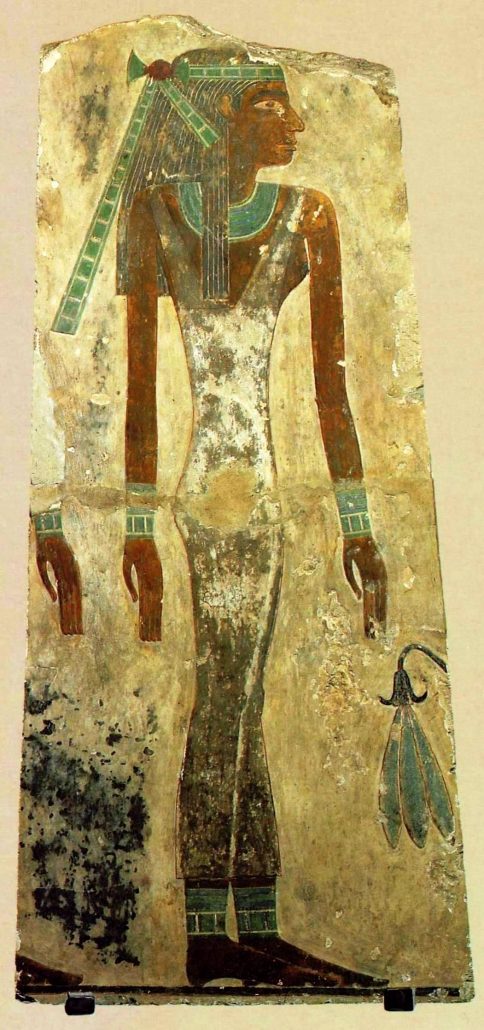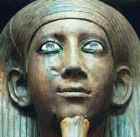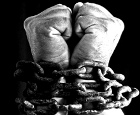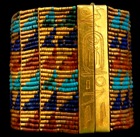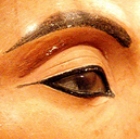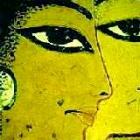The Egyptian Asenath & Joseph – the story

The Eye of Horus – an Egyptian symbol of protection against evil
Asenath’s story has three parts:
- Joseph escapes his prison sentence. Wrongly convicted of a crime he did not commit, Joseph lies rotting in prison. But his clever mind and his gift for interpreting dreams stands him in good stead, and he is brought before Pharaoh to interpret a frightening dream.
- Joseph and Asenath marry. Pharaoh is so impressed by Joseph’s shrewd intelligence that he employs him to re-organize grain supplies for Egypt. Joseph is successful and, among other favours,
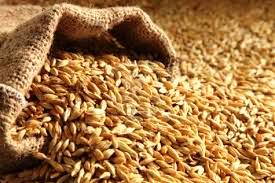 Pharaoh arranges that Joseph marry a high-born Egyptian woman called Asenath.
Pharaoh arranges that Joseph marry a high-born Egyptian woman called Asenath. - Asenath has two sons who will be essential to the Israelites’ later history: Manasseh and Ephraim, who will be the forefathers of two of the twelve tribes of Israel.
Joseph escapes his prison sentence
When this story begins, Joseph son of Jacob was in a dangerous situation. He was in Egypt and had been falsely accused of adultery and thrown into prison, where he was left to rot. His future was bleak. He was in a foreign country, without contacts, friends or influence.
But he had two valuable resources:
- his brains
- and his faith in God.
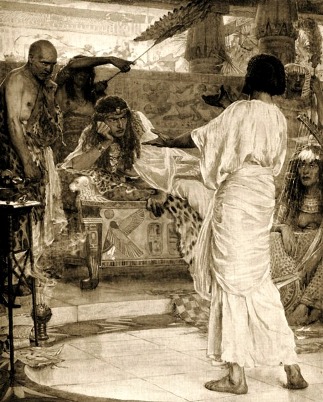
Joseph & Asenath: Pharaoh listens to Joseph’s interpretation of his dream
He used these to leverage himself out of what seemed a hopeless situation.
Joseph was innately sensitive to the minds of other people, and this made him good at interpreting dreams. He would use what he knew of their hopes and fears to explain the dream to them.
This Joseph did when he was in prison. He was so good at it that people began to talk about him and seek out his advice.
Eventually his skill was mentioned in high places, and he was brought before Pharaoh in the hope that he might be able to interpret a rather obscure and worrying dream that was plaguing Pharaoh’s mind.
Joseph brought a fresh perspective. He was able to interpret the dream so successfully that Pharaoh entrusted him with much more than merely interpreting an occasional dream.
His former troubles forgotten, Joseph was taken into Pharaoh’s service, where he became increasingly trusted with running the country.
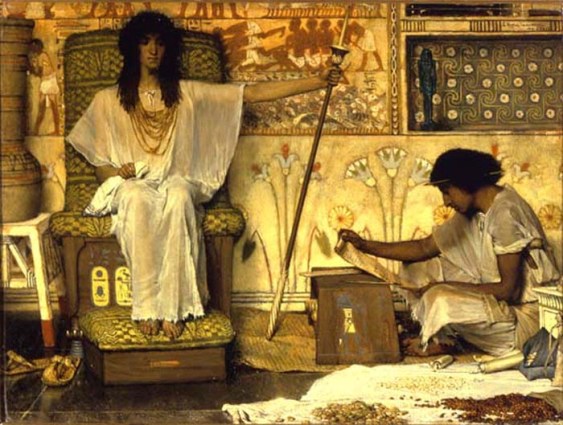
Asenath & Joseph: Joseph, overseer of Pharaoh’s graneries, Alma Tadema
Right from the start, Joseph did all he could to integrate himself into Egyptian culture (though he drew the line at having sexual intercourse with Potiphar’s adulterous wife).
When he was released from prison, the Bible notes that he was shaved and given a change of clothes before he appeared before Pharaoh.
Why is this important? Because
- Hebrews were not clean-shaven; Egyptians shaved their head and face
- Hebrews wore home-spun woollen cloth; Egyptians wore linen or cotton wrap-around ‘skirts’
This seemingly unimportant detail contained a message for Diaspora Jews (which is what Joseph was): integrate as far as you can into your host community if you want to succeed.
Asenath marries Joseph
What else? It was important that Joseph be seen as ‘one of us’. So Pharaoh arranged for him to marry a high-born Egyptian woman – Asenath. This was another a way of de-Semitizing Joseph, making him acceptable to courtiers and commoners alike.
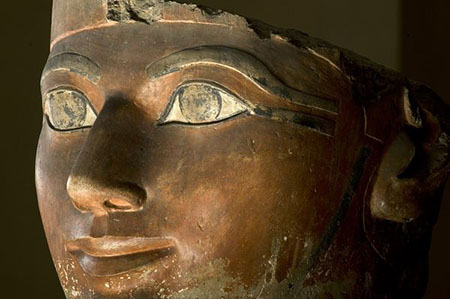
Statue of a beautiful woman from ancient Egypt
The young woman chosen was Asenath, a high-born, aristocratic Egyptian woman, the daughter of Potiphera, a priest of On. ‘On’ was another name for Heliopolis, which was the religious centre of Ra, the god representing the sun.
So Asenath was
- brought up in the super-respectable atmosphere of a priest’s household
- literate and well-educated
- astute enough to agree to an advantageous if somewhat unexpected marriage.
Joseph was given a new name, Zaphenath-paneah.
This and his marriage to a priest’s daughter made him outwardly Egyptian, but it was not a religious capitulation. He made this clear by unambiguously naming God as the source of his interpretation: ‘It is not I; God will give Pharaoh a favourable answer’ (Genesis 41:16) and ‘God as revealed to Pharaoh what he is about to do.’ (Genesis 41:25)
All together, these changes wrought by Pharaoh were a message to others that Joseph, though a Hebrew, was fully accepted at the Egyptian court and integrated into the Egyptian way of life.
In particular, Joseph’s Egyptian wife was a visible sign that he was ‘one of us’.
Asenath has two important sons
But why is Asenath mentioned at all?
Because during the course of her marriage Asenath had at least two children, sons called
- Manasseh ‘God has made me forget all my hardship and all my father’s house’, and
- Ephraim ‘God has made me fruitful in the land of my misfortunes’.
Notice that both these names are Joseph’s point of view, not Asenath’s. There can be little doubt of who the dominant partner was in this marriage.
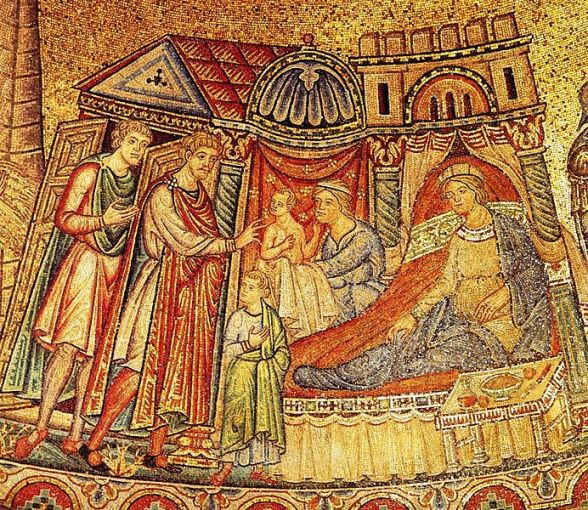
The midwife presents the second of two sons to Joseph. Basilica of San Marco
Asenath had both of these sons during the time when the Egyptian economy was booming: it was ‘a land of plenty’.
But when Manasseh and Ephraim were still quite young, things changed.
- The Nile floods were meagre.
- Less land was covered with the life-giving silt.
- Crops were poor.
It was then that Asenath saw the true measure of her husband. He had been right in his prediction of famine, and wise to store up the country’s resources against future trouble. Because of Joseph’s foresight, the people did not starve, and her position in society was even stronger than before.
Eventually Joseph was joined in Egypt by the whole of his extended family ‘Jacob and all his offspring with him, his sons, and his son’s sons with him, his daughters, and his sons’ daughters; all his offspring he brought with him into Egypt’.
Asenath’s reaction to this invasion by her husband’s very large family is not recorded….
What do the names mean?
- Asenath means ‘gift of the sun-god’
- Joseph means ‘God increases or adds to’
- Manasseh means ‘God has made me forget all my hardships’; he became patriarch of one of the Israelite tribes
- Ephraim ‘God has made me fruitful in the land of my misfortunes’; he also became a patriarch of an Israelite tribe
Main theme of Asenath’s story
- Accepting God’s plan for us. Asenath must have had considerable reservations about her future husband. He had been accused of rape and thrown into gaol. Moreover, he was a foreigner whose people were nomadic herders – not the sort of man a high-born woman might have hoped to marry.
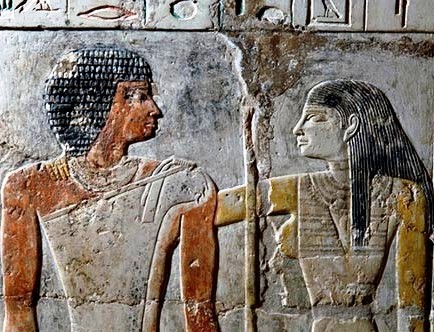
Asenath & Joseph: Mural of an Egyptian man and woman expressing affection, a rare image in ancient Egyptian art
But through her marriage with Joseph she became the fore-mother of two important Israelite tribes who later settled in the heart of Canaan and adjacent Transjordan.
- God’s providence: what looks like a disaster may turn into an advantage. If Joseph had never been thrown into gaol, he would never have developed his talent for interpreting dreams, and never come to Pharaoh’s attention. He certainly would never have married a high-born, cultivated woman like Asenath.
- The story seems to be set during the Middle Kingdom, somewhere between 2030BC to 1640BC. It’s not impossible that Asenath, as a daughter of a priest of the sun-god Ra, may have played some part in the development of the Israelite concept of Yahweh, the single all-powerful God.
What Asenath may have looked like
This tomb painting is from the 12th dynasty governor Djehutihotep. It shows one of his sisters.
She is elaborately bejewelled and wears a long, plain white dress and a hair band. Her skin is the conventional yellow. This is important, because it shows she led a privileged life shaded from the hot Egyptian sun.
Egyptian portraits can look a little odd, because they had to show all the essential components – head, chest, legs, etc. They ignored what a person actually looked like, and turned the shoulders round to face the viewer. Clothes are shown as if they are seen front-on. In fact, the woman’s dress would have covered both breasts, but the profile treatment forced artists to show one breast exposed. Both feet were shown as if seen from the inside, so that only the big toe is drawn. This was how it was done form more than 3,000 years. The Egyptian artists were definitely traditionalists…
Note: Some Jewish commentators have been unhappy with the idea that two Israelite tribes, Manasseh’s and Ephraim’s, were descendants of a non-Israelite mother. They have suggested that Asenath was a convert to Judaism before she married Joseph, or that she was another woman altogether: Joseph’s sister Dinah who was raped by Shechem. The interpretation on this page depends on the story as it appears in the Book of Genesis.
The Bible text

Abundant grain
28 It is as I told Pharaoh, God has shown to Pharaoh what he is about to do. 29 There will come seven years of great plenty throughout all the land of Egypt, 30 but after them there will arise seven years of famine, and all the plenty will be forgotten in the land of Egypt; the famine will consume the land, 31 and the plenty will be unknown in the land by reason of that famine which will follow, for it will be very grievous. 32 And the doubling of Pharaoh’s dream means that the thing is fixed by God, and God will shortly bring it to pass. 33 Now therefore let Pharaoh select a man discreet and wise, and set him over the land of Egypt. 34 Let Pharaoh proceed to appoint overseers over the land, and take the fifth part of the produce of the land of Egypt during the seven plenteous years. 35 And let them gather all the food of these good years that are coming, and lay up grain under the authority of Pharaoh for food in the cities, and let them keep it. 36 That food shall be a reserve for the land against the seven years of famine which are to befall the land of Egypt, so that the land may not perish through the famine.” 37 This proposal seemed good to Pharaoh and to all his servants. 38 And Pharaoh said to his servants, “Can we find such a man as this, in whom is the Spirit of God?” 39 So Pharaoh said to Joseph, “Since God has shown you all this, there is none so discreet and wise as you are; 40 you shall be over my house, and all my people shall order themselves as you command; only as regards the throne will I be greater than you.” 41 And Pharaoh said to Joseph, “Behold, I have set you over all the land of Egypt.” 42 Then Pharaoh took his signet ring from his hand and put it on Joseph’s hand, and arrayed him in garments of fine linen, and put a gold chain about his neck; 43 and he made him to ride in his second chariot; and they cried before him, “Bow the knee!” Thus he set him over all the land of Egypt. 44 Moreover Pharaoh said to Joseph, “I am Pharaoh, and without your consent no man shall lift up hand or foot in all the land of Egypt.” 45
 And Pharaoh called Joseph’s name Zaph’enath-pane’ah; and he gave him in marriage As’enath, the daughter of Poti’phera priest of On. So Joseph went out over the land of Egypt. 46 Joseph was thirty years old when he entered the service of Pharaoh king of Egypt. And Joseph went out from the presence of Pharaoh, and went through all the land of Egypt. 47 During the seven plenteous years the earth brought forth abundantly, 48 and he gathered up all the food of the seven years when there was plenty in the land of Egypt, and stored up food in the cities; he stored up in every city the food from the fields around it. 49 And Joseph stored up grain in great abundance, like the sand of the sea, until he ceased to measure it, for it could not be measured. 50 Before the year of famine came, Joseph had two sons, whom As’enath, the daughter of Poti’phera priest of On, bore to him. 51 Joseph called the name of the first-born Manas’seh, “For,” he said, “God has made me forget all my hardship and all my father’s house.” 52 The name of the second he called E’phraim, “For God has made me fruitful in the land of my affliction.” 53 The seven years of plenty that prevailed in the land of Egypt came to an end; 54 and the seven years of famine began to come, as Joseph had said. There was famine in all lands; but in all the land of Egypt there was bread. 55 When all the land of Egypt was famished, the people cried to Pharaoh for bread; and Pharaoh said to all the Egyptians, “Go to Joseph; what he says to you, do.” 56 So when the famine had spread over all the land, Joseph opened all the storehouses, and sold to the Egyptians, for the famine was severe in the land of Egypt. 57 Moreover, all the earth came to Egypt to Joseph to buy grain, because the famine was severe over all the earth.’
And Pharaoh called Joseph’s name Zaph’enath-pane’ah; and he gave him in marriage As’enath, the daughter of Poti’phera priest of On. So Joseph went out over the land of Egypt. 46 Joseph was thirty years old when he entered the service of Pharaoh king of Egypt. And Joseph went out from the presence of Pharaoh, and went through all the land of Egypt. 47 During the seven plenteous years the earth brought forth abundantly, 48 and he gathered up all the food of the seven years when there was plenty in the land of Egypt, and stored up food in the cities; he stored up in every city the food from the fields around it. 49 And Joseph stored up grain in great abundance, like the sand of the sea, until he ceased to measure it, for it could not be measured. 50 Before the year of famine came, Joseph had two sons, whom As’enath, the daughter of Poti’phera priest of On, bore to him. 51 Joseph called the name of the first-born Manas’seh, “For,” he said, “God has made me forget all my hardship and all my father’s house.” 52 The name of the second he called E’phraim, “For God has made me fruitful in the land of my affliction.” 53 The seven years of plenty that prevailed in the land of Egypt came to an end; 54 and the seven years of famine began to come, as Joseph had said. There was famine in all lands; but in all the land of Egypt there was bread. 55 When all the land of Egypt was famished, the people cried to Pharaoh for bread; and Pharaoh said to all the Egyptians, “Go to Joseph; what he says to you, do.” 56 So when the famine had spread over all the land, Joseph opened all the storehouses, and sold to the Egyptians, for the famine was severe in the land of Egypt. 57 Moreover, all the earth came to Egypt to Joseph to buy grain, because the famine was severe over all the earth.’

Custom Search
Read about more of the fascinating women of the Bible
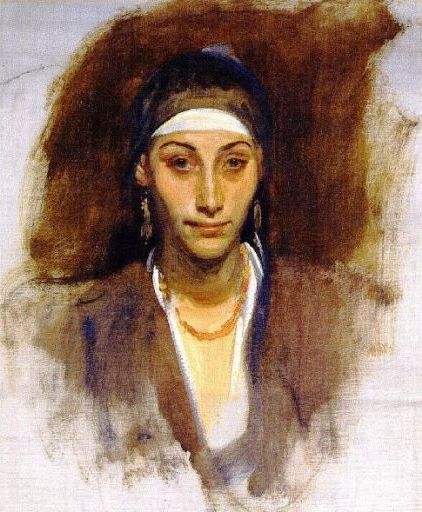
John Singer Sargant’s ‘Egyptian Woman with Earrings’
Bible Study Resource for Women in the Bible: Asenath,
wife of Joseph of Egypt
Bible Study Resource
© Copyright 2006
Elizabeth Fletcher

